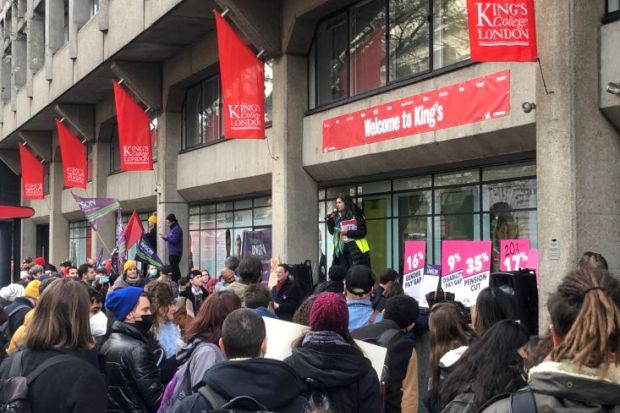The University and College Union will stage UK-wide strikes on 24 and 25 November, followed by a third walkout five days later on 30 November, it has been confirmed.
Academics will take industrial action over pay and working conditions, with 150 universities able to take part for the first time in the long-running disputes. Sixty-seven of the branches are also striking over changes to pensions provided by the Universities Superannuation Scheme (USS).
It means that about 70,000 UCU members could take part in the action after the union ran an aggregated ballot for the first time in recent years. UK universities will have been affected by strikes for five years in a row and the union’s leader, Jo Grady, said that the latest action would be on a “scale never seen before”.
UCU said university leaders could still avert the disruption by returning to the negotiating table and improving on the pay offer of 3 per cent given to most staff in August but warned that, unless a new deal could be made, the strike action will “escalate in the new year alongside a marking and assessment boycott”.
Academics will also begin action short of a strike from 23 November, including working only their contracted hours and refusing to cover for absent colleagues.
“This is not a dispute about affordability – it is about choices,” Dr Grady said. “Vice-chancellors are choosing to pay themselves hundreds of thousands of pounds whilst forcing our members onto low paid and insecure contracts that leave some using foodbanks. They choose to hold billions in surpluses whilst slashing staff pensions.
“UCU members do not want to strike but are doing so to save the sector and win dignity at work. This dispute has the mass support of students because they know their learning conditions are our members’ working conditions.”
Chloe Field, the National Union of Students’ vice-president for higher education, said students’ “struggles” were “inextricably linked to the reasons that staff are striking”.
“High rents, astronomical international student fees, and cuts to maintenance support have happened for the same reasons that staff are suffering under huge workloads – the failed marketisation of the sector which has put profit above staff and student well-being,” she said. “Universities and employers must come to the table and take meaningful action to end these disputes.”
Raj Jethwa, chief executive of the Universities and Colleges Employers Association, said institutions fully recognised the “inflationary pressures currently facing staff” and said that the body was looking at the possibility of bringing forward the 2023-24 pay negotiations as a result.
“Any threats of industrial action will do nothing to support students, staff or the many HE institutions working hard to avoid redundancies or maintain staffing levels, having delivered the August pay uplift,” he added.
“UCU needs to provide its members with a realistic and fair assessment of what is achievable before encouraging strike action directed at students once again. Ucea and its member HE institutions always seek to work with UCU and other trade unions to support staff and students and to avoid any unfair disruptive action.”
Institutions “face significant cost increases”, Mr Jethwa added, with “most enduring falling income in real terms” and any increase in pay “puts jobs at risk”.
A spokeswoman for Universities UK, which represents USS employers, said it was “saddened” by UCU members’ plans to strike.
She said the body was already working with UCU ahead of the next valuation of the scheme in March 2023 – which could lead to improved benefits – “including sending a joint statement to the Department of Work and Pensions on pension regulation, establishing a technical group on valuation methodology, and on low cost options for employees who want more flexible pension contributions, and scheme redesign”.
The “highly volatile economic climate” has meant the USS has been “unable establish a long-term view of its funding position, or revise its prices” ahead of the valuation, she said.




